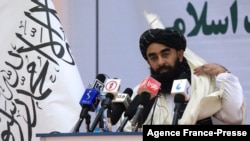The Taliban are pushing back against persistent global criticism of their Islamic governance in Afghanistan, claiming their supreme leader's decrees, including a general amnesty, have promoted national reconciliation and put the war-torn country on the path to stability.
Zabihullah Mujahid, the chief Taliban spokesman, Wednesday posted a 40-minute promotional video documentary on social media, showcasing some of the decrees and touting their "good" outcomes more than two years into their male-only government, known as the Islamic Emirate.
However, the video did not discuss several other decrees issued by reclusive Taliban supreme leader, Hibatullah Akhundzada, that placed an indefinite ban on Afghan girls' education beyond the sixth grade and barred most women from workplaces, including the United Nations and other aid groups.
"The general amnesty has reunited Afghans," Mujahid wrote on X, formerly known as Twitter, with the video. He referred to the decree that reclusive Taliban chief Hibatullah Akhundzada first issued after the then-insurgent group reclaimed power from a U.S.-backed government in August 2021.
The amnesty covered all members and politicians associated with the ousted Afghan government and individuals who worked for the U.S.-led Western troops during their presence in Afghanistan for almost two decades.
While appearing in the documentary, Mujahid said that the amnesty decree was being enforced "effectively and seriously" nationwide by Taliban authorities, saying those found guilty of breaching it in "a few instances" were brought to justice and jailed.
Mujahid's social media post came a day after a senior U.N. diplomat renewed allegations the Taliban's "repressive policies and practices" were responsible for a deteriorating human rights situation in Afghanistan.
"There is a culture of impunity for torture and inhumane treatment in detention centers, as well as for human rights violations against former government officials and military personnel, despite promises made to the contrary," Richard Bennett, the special rapporteur on the situation of Afghan human rights, told a U.N. meeting in New York on Tuesday.
Last August, a U.N. report accused Taliban fighters of committing more than 200 extrajudicial killings since taking power despite the general amnesty. It documented at least 800 alleged offenses, including arbitrary arrests and detention, ill-treatment, torture, and enforced disappearances of former Afghan officials and security personnel.
The Taliban at the time rejected the U.N. findings, declaring them unfounded and propaganda to malign their administration.
While speaking Tuesday, the U.S. representative told the U.N. meeting that the Taliban continue to issue edicts targeting women and girls, human rights defenders, women's rights activists, journalists, former government officials, and other vulnerable Afghan groups, including religious minorities.
"Until the Taliban honors their word to respect the human rights of all Afghans, the international community must monitor the situation in Afghanistan with vigilance and hold the Taliban accountable," said David Johnson, U.S. senior advisor for South and Central Asia.
Taliban officials have repeatedly rejected criticism of their policies, saying they are aligned with Afghan culture and Islamic law.
The Taliban documentary hailed Akhundzada's decree on women's rights, saying it prohibited forced marriages of women and ensured their right to inheritance, dowry, and fair treatment, among other rights, within Islamic law, or Sharia.
The video also highlighted "among others, the decree outlawing poppy cultivation in Afghanistan, which is known as the world's largest producer of narcotics.
"Now we believe that we do not have even one percent of poppy cultivation in Afghanistan. God willing, in the coming days, we will have an Afghanistan free of drug cultivation and smuggling," Mujahid said.
Recent media reports and satellite images backed by the U.N. and the U.S. have concluded that annual poppy cultivation "significantly" decreased in the country. However, critics remain skeptical about whether the gains are sustainable, noting that de facto Afghan authorities have not yet provided an alternative livelihood program for farmers affected by the ban in the impoverished nation.
The U.N. Office on Drugs and Crimes, in its report last month, revealed that Afghanistan had become the world's fastest-growing producer of methamphetamine. It noted that the highly addictive stimulant is mainly made from legally available substances or extracted from the ephedra plant, which grows in the wild.
The Taliban documentary commentator echoed its government's assertions that Akhundzada's decrees "are based on the demands of a healthy and Islamic society and raised the hopes of Afghans for a better future."
No foreign government has recognized the Taliban government over human rights concerns and their treatment of Afghan women.






